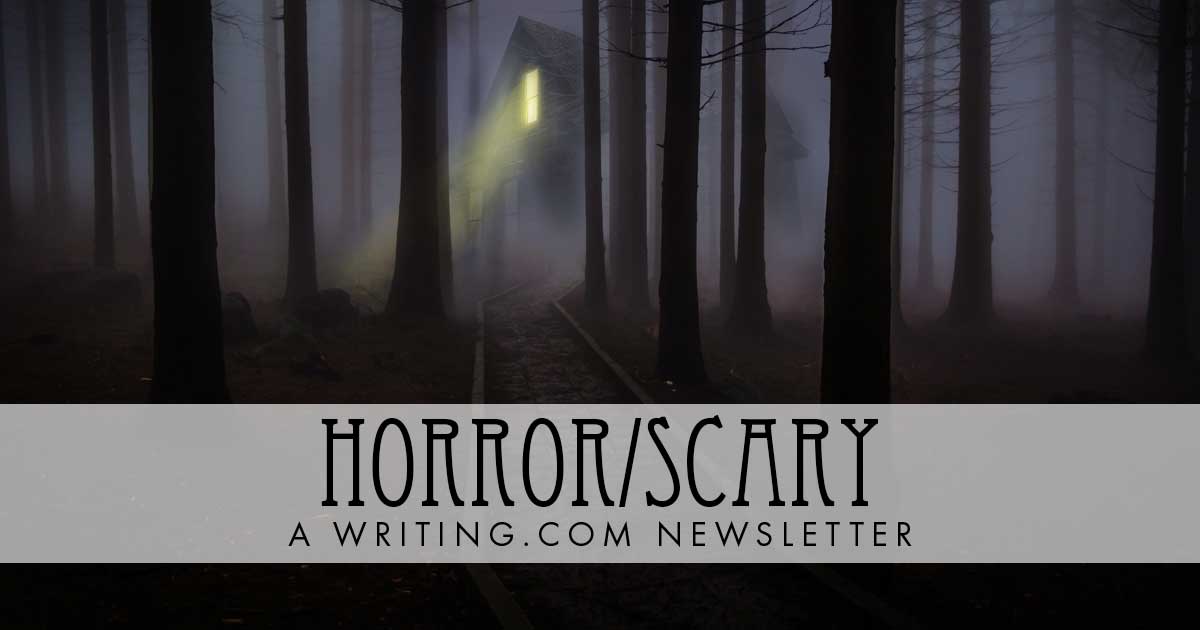This week: Techniques for a Truly Scary Story Edited by: Writing.Com Support  
More Newsletters By This Editor 
![Table of Contents [#401437]
Table of Contents](https://www.Writing.Com/main/trans.gif) ![Table of Contents [#401437]
Table of Contents Table of Contents](/main/images/action/display/ver/1709303267/item_id/401437.png)
1. About this Newsletter
2. A Word from our Sponsor
3. Letter from the Editor
4. Editor's Picks
5. A Word from Writing.Com
6. Ask & Answer
7. Removal instructions
![About This Newsletter [#401439]
About This Newsletter](https://www.Writing.Com/main/trans.gif) ![About This Newsletter [#401439]
About This Newsletter About This Newsletter](https://www.writing.com/main/images/action/display/ver/1709303676/item_id/401439.png)
| In this editorial, we delve into the art of crafting a truly scary atmosphere and tone in your horror writing. Drawing on our own experiences, we share tips on how to start with a strong concept that taps into primal fears, use sensory details to create a vivid and immersive world, and pace your story to build tension and suspense. Whether you're a seasoned horror writer or just starting out, these techniques will help you create stories that truly terrify your readers. |
![Word from our sponsor [#401440]
Word from our sponsor](https://www.Writing.Com/main/trans.gif) ![Word from our sponsor [#401440]
Word from our sponsor Word from our sponsor](https://www.writing.com/main/images/action/display/ver/1709303724/item_id/401440.png)
| ASIN: B01DSJSURY |
Product Type: Kindle Store
|
Amazon's Price: $ 5.99
|
|
![Letter from the editor [#401442]
Letter from the editor](https://www.Writing.Com/main/trans.gif) ![Letter from the editor [#401442]
Letter from the editor Letter from the editor](https://www.writing.com/main/images/action/display/ver/1709303784/item_id/401442.png)
Do you ever feel like something is watching you, just out of the corner of your eye?  Do you ever hear a sound that you can't quite place, and feel a creeping sense of unease settling over you? If so, then you know what it feels like to be truly scared - and that's exactly the feeling we want to capture in our horror writing. Do you ever hear a sound that you can't quite place, and feel a creeping sense of unease settling over you? If so, then you know what it feels like to be truly scared - and that's exactly the feeling we want to capture in our horror writing.
Creating a scary atmosphere isn't easy. It requires tapping into the deepest, darkest fears that lurk in the human psyche. But if you're up to the challenge, then there are a few techniques you can use to make your readers feel like they're living in a nightmare.
First and foremost, start with a concept that terrifies you. It could be anything from a creature that feeds on fear to a cursed object that brings about terrible misfortune. By focusing on something that truly scares you, you can build a story that will resonate with readers on a primal level.
But concept alone isn't enough to make a story truly terrifying... You need to use sensory details to create a vivid, immersive world that draws readers in and keeps them on edge. The sound of footsteps echoing through an empty hallway, the smell of rotting flesh, the taste of bile rising in your throat - these are the details that will make your readers feel like they're living the horror alongside your characters.
Of course, pacing is also key. You don't want to scare your readers so much that they tune out, but you don't want to let them get too comfortable either. Use moments of quiet to build tension, and then unleash a sudden shock that will make them jump out of their seats.
Sometimes, less is more when it comes to creating a scary atmosphere. Instead of describing every detail of a terrifying monster or situation, use subtle clues to hint at their presence and let your readers' imaginations do the rest. By planting seeds of fear in their minds, you can create a lasting sense of dread that will stay with them long after they've finished reading.
Another powerful technique is to subvert reader expectations. This involves using familiar horror tropes or situations and then twisting them in unexpected ways to keep readers on edge. By taking something familiar and making it unsettling or unexpected, you can increase readers' sense of unease and keep them guessing about what might happen next.
Crafting a truly frightening ambience takes time and effort, but it's worth it when you see your readers trembling with fear. So take a deep breath, turn off the lights, and let your imagination run wild. You never know what horrors you might uncover. |
![Editor's Picks [#401445]
Editor's Picks](https://www.Writing.Com/main/trans.gif) ![Editor's Picks [#401445]
Editor's Picks Editor's Picks](https://www.writing.com/main/images/action/display/ver/1709303830/item_id/401445.png)
![Word From Writing.Com [#401447]
Word from Writing.Com](https://www.Writing.Com/main/trans.gif) ![Word From Writing.Com [#401447]
Word from Writing.Com Word from Writing.Com](https://www.writing.com/main/images/action/display/ver/1709303874/item_id/401447.png)
Have an opinion on what you've read here today? Then send the Editor feedback! Find an item that you think would be perfect for showcasing here? Submit it for consideration in the newsletter!
https://www.Writing.Com/go/nl_form
Don't forget to support our sponsor!
| ASIN: B01DSJSURY |
Product Type: Kindle Store
|
Amazon's Price: $ 5.99
|
|
![Ask & Answer [#401448]
Ask & Answer](https://www.Writing.Com/main/trans.gif) ![Ask & Answer [#401448]
Ask & Answer Ask & Answer](https://www.writing.com/main/images/action/display/ver/1709303902/item_id/401448.png)
![Word from our sponsor [#401440]
Word from our sponsor](https://www.Writing.Com/main/trans.gif) ![Word from our sponsor [#401440]
Word from our sponsor Word from our sponsor](https://www.writing.com/main/images/action/display/ver/1709303724/item_id/401440.png)
| ASIN: 197380364X |
|
Amazon's Price: $ 15.50
|
|
![Unsubscribe [#401452]
Removal Instructions](https://www.Writing.Com/main/trans.gif) ![Unsubscribe [#401452]
Removal Instructions Removal Instructions](https://www.writing.com/main/images/action/display/ver/1709303960/item_id/401452.png)
To stop receiving this newsletter, click here for your newsletter subscription list. Simply uncheck the box next to any newsletter(s) you wish to cancel and then click to "Submit Changes". You can edit your subscriptions at any time.
|
